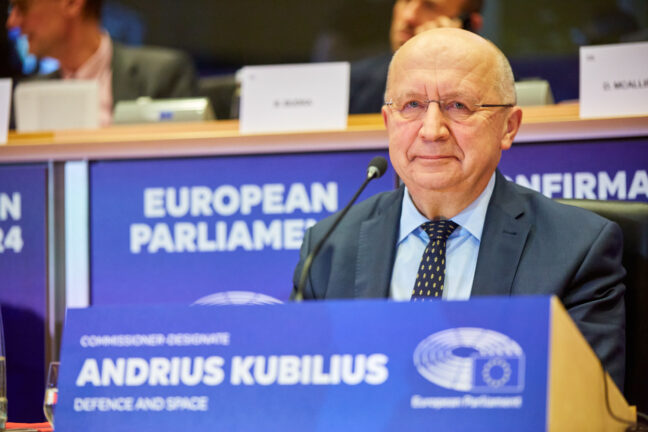Apart from a horrific time squeeze and potentially fatal uncertainty surrounding its powerful American ally, the European Union’s need for a swift rearmament is bogged down in the bloc’s labyrinthine decision-making process, the European Parliament’s Industry, Research and Energy Committee heard last week.
Andrius Kubilius did all he could. However, as the European Union Defence and Space Commissioner presented the dilemmas of his portfolio in the context of the current geopolitical tumult to the EP’s ITRE Committee on 6 March, he made it clear that the Commission did not have much by way of ammunition – literally and figuratively.
Faced with MEPs‘ impatience, exasperation and, at times, outright hostility, Mr Kubilius came across as a good-natured man genuinely unhappy about his own lack of leverage over the unfolding events. The Commissioner spoke to the ITRE Committee of the European Parliament about the executive arm’s plans to balance the bloc’s various defence needs. From his opening speech and the following Q&A session with the MEPs, a list of dilemmas emerged, each of them a conundrum with no clear solutions.
Mr Kubilius had about 90 minutes to discuss the ins and outs of European defence and space issues before having to attend to other duties. In his ten-minute introductory speech, he explained the five-point plan for European defence the Council of the European Union would approve later that night.
You might be interested
The Commissioner mentioned how the plan “opened up fiscal space” for €800bn in additional defence spending; how the bloc needed “a quick action” and the development of a single defence market; how he himself and the entire Commission agreed with the positions voiced previously on the sensitive topic by President Emmanuel Macron of France, Prime Minister Sir Keir Starmer of the United Kingdom, Bundeskanzler-in-waiting Friedrich Merz of Germany, or Secretary General Mark Rutte of NATO.
The Commissioner also said that the Union found itself at a “historical moment”. Tellingly, he emphasised the need for collaboration with the United States, to which Europe is thankful for all the good transatlantic ties. The Lithuanian erstwhile two-time prime minister also highlighted the importance of space exploration and praised the positive development of the EU’s relations with India in the field.
Too late, too little
The mood would take a sombre turn shortly after Mr Kubilius began to field the MEPs‘ questions. Christian Ehler MEP (EPP/DE) mentioned the fragmentation of the European defence market, and asked what precisely a single market would mean. Is it an unfettered laissez-faire approach to “unrestricted circulation of defence products across the EU”, or the establishment of a preference principle tied to territoriality?
The Commissioner put on a brave face. “How much time do I have for the answer?” “Two minutes,” ITRE Chair Borys Budka (EPP/PL) replied. “Not ten?” Mr Kubilius smiled. Then he let the reality sink in. “As far as I know, the previous commission brought EDIP regulation to the European Parliament last April. We’ve had almost one year, and despite our common political understanding, about the danger, we still do not have the regulation. “
EDIP is a regulation proposed by the Commission to start implementing concrete measures identified in the European Defence Industrial Strategy. It is meant to provide financial support to the tune of €1.5bn from the EU budget over the period 2025-2027.
The problem is, as Commissioner Kubilius acknowledged, that EDIP not only takes too long to get through the EU co-legislative bodies, but is also woefully small. “You see, the fiscal space we created is about eight hundred billion. EDIP will have €1.5bn at its disposal. So for all our pretensions on how influential we can be… it’s quite limited,” Mr Kubilius said. He was not smiling.
As further debate made clear, the Commissioner hopes to “incentivize the member states to spend on defence” and “that the member states will use the fiscal space efficiently”. The dilemma of how to satisfy the demands for a single market (necessary to achieve more efficient defence production and procurement) without compromising the EU decision-making procedures has thus remained something of an elephant in the room.
The European defence premises, sadly, hosts a number of such large pachyderms. Commissioner Kubilius acknowledged that it was “difficult to come with a proper language” for the White Paper on defense “when things are coming faster than we thought”. The Commission hopes to have the White Paper approved during the next Council summit on 19 March.
This particular elephant – the gap between any long-term strategy and the bloc’s immediate defence needs – was addressed by Rihards Kols MEP (ECR/LAT). “The von der Leyen plan is a major shift, while at the same time, you are preparing the White Book on defense. Can you confirm the two are coordinated? A white paper that does not reflect the reality would be obsolete before it’s even published,” the Latvian MEP said.
Mr Kubilius looked almost sad by then. “Some ideas are coming into the public very rapidly,” he explained. “We are calculating them while defining the White Paper. We have lots of input, lot of meetings. We need a big bang, not incremental progress,” he said.
Planning for NATO needs
Mr Kols had more in stock. “Can we move the troops and equipment fast enough to where they are needed most? Today, the answer still is – no. The entire €1.7bn budget for military mobility is all spent and Germany alone estimates it needs €500bn for military infrastructure. Without (adequate mobility) the strategy means nothing.”
The Commissioner did not appear to have a great deal to say in response. “You see, defense spending is not, like people think, that the EU brings in a miraculous amount of money and all’s well. Military spending is also national spending, and what we are trying to do is to free up space for countries to spend money on defence, meaning also on military mobility, for instance.”
Yet another dilemma was highlighted by Ville Niinistö MEP (Greens-EFA/FIN). “We are now on track to do roughly what the Russians are spending, and about a half of what the Americans are spending. So far, about 16 percent goes to joint EU procurement, and about 63 percent is being ordered from the US.” The question is, even if the idea of joint procurement takes off, should the Europeans buy defence products from the United States, a country that for all intents and purposes is an enemy rather than a friend?
“Our needs are calculated according to NATO plans. We are on the same page, and we need to speed up implementations,” Mr Kubilius said hopefully. Three days later, Elon Musk, arguably the second most influential man of the Trump administration, advocated for the United States leaving NATO.
Other matters of varying degree of urgency were discussed at the ITRE meeting. The Danish procurement model (ordering defence products from Ukraine) was mentioned, as the Ukrainian production capacity grew 35-fold over the first two years of the Russian aggression (the Commissioner is all for it). A question was asked whether the European-made Galileo satellite navigation system could replace Elon Musk’s Starlink (not really).
There was more. A Finnish MEP asked why the Italian government was pouring money into Elon Musk’s SpaceX, and was duly assured by an Italian MEP that Rome was not doing that. An Irish MEP asked what the Commission would do about the security of sea cables (“70 percent of them run through Irish waters”), and received a reply from the Commissioner that the Baltic countries are worse off still. The Committee also heard a complaint about Slovenian banks not lending enough money to defence companies, a problem for which no immediate solution was found.
Putinists, not patriots
The Committee was also told that Patriots for Europe “are no patriots but putinists” on the grounds of the alleged absence of its committee members at the meeting. It then heard the very faction’s member Pascale Piera slamming the defence plans introduced “at the cost of massive debt, while we cannot even repay the debts we made in the past. What you call budgetary flexibility is a crazy race for indebtedness”. The French MEP then asked: “How seriously do you want to bring the public opinion with you on such a project? “
Mr Kubilius had a reply ready. “If you look at the Eurobarometer poll, you will see that 70 percent of Europeans want much stronger Europe on defence,” he said. “Normal people understand this very well: defence costs a lot but not preparedness costs a lot more,” before evoking the oft-quoted ancient Roman adage “if you want peace, prepare for war”. Then the Commissioner turned the question on its head: “I’m asking you – do you really want peace on our continent? If you are, please support what we are trying to do now.”
The exchange summed up the meeting neatly. The gap between political understanding and any actual action remains extremely difficult to bridge.











